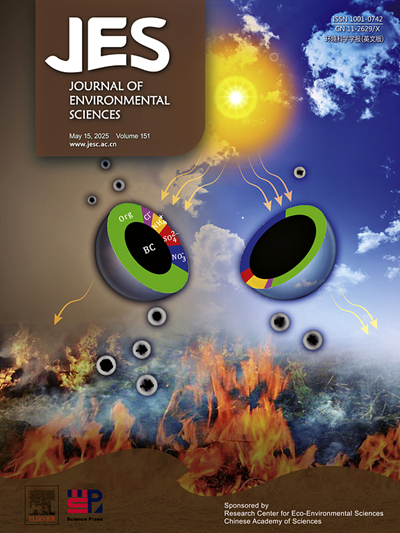Propanol as electron donor for efficient odd-chain carboxylate production by chain elongation with reactor microbiomes
IF 5.9
2区 环境科学与生态学
Q1 ENVIRONMENTAL SCIENCES
引用次数: 0
Abstract
Microbial consortia that catalyze chain elongation processes have been enriched using different selection strategies, for which the electron donor is an essential one. Propanol is an extraordinarily promising electron donor because it can be generated from renewable resources, including lignocellulosic biomass and protein wastes. Here, propanol was proven in detail to be an efficient electron donor, enhancing the production of odd medium-chain carboxylates during chain elongation. By exploring various electron acceptors, reactor conditions, and electron donor/electron acceptor mol ratios, our study highlights that acetate is the most suitable electron acceptor for the production of both odd- and even-chain carboxylates. The optimal conditions for propanol-based chain elongation were 30 °C and pH 6, achieving 82.8 % selectivity for odd-chain carboxylates. Another critical insight from our work is that a propanol/acetate mol ratio of 1:1 can minimize the inhibitory effect of propanol and maximize the yield of medium-chain carboxylates, with the highest concentration of n-heptanoate reaching 124.5 mmol C/L. This was further illustrated by 16S rRNA amplicon sequencing, which elucidated that the community composition and keystone species in a propanol-based reactor closely resembled that of the ethanol one. The dominant phylum of the propanol-based reactor, Firmicutes showed a significant positive correlation with the concentrations of n-caproate and n-valerate. Additionally, the co-occurrence of Clostridium sensu stricto 12 and Oscillibacter, known as typical chain elongators, was identified within the propanol-based reactor. These findings enhance our understanding of propanol-based chain elongation, offer guiding principles for reactor microbiota assembly, and support efficient odd medium-chain carboxylate production.

丙醇作为电子供体,利用反应器微生物群通过链延伸高效生产奇链羧酸盐
不同的选择策略丰富了催化链延伸过程的微生物群落,其中电子给体是必不可少的选择策略。丙醇是一种非常有前途的电子供体,因为它可以从可再生资源中产生,包括木质纤维素生物质和蛋白质废物。在这里,丙醇被详细证明是一个有效的电子供体,在链延伸过程中促进奇数中链羧酸酯的产生。通过探索各种电子受体、反应器条件和电子供体/电子受体的摩尔比,我们的研究强调了醋酸盐是最适合生产奇链和偶数链羧酸盐的电子受体。丙醇基链延伸的最佳条件为30°C和pH 6,对奇链羧酸盐的选择性为82.8%。本研究的另一个重要发现是,当丙醇与乙酸酯的物质比为1:1时,丙醇的抑制作用最小,中链羧酸酯的产量最大,正庚酸酯的最高浓度可达124.5 mmol C/L。16S rRNA扩增子测序进一步证实了这一点,表明丙醇反应器中的群落组成和关键物种与乙醇反应器非常相似。厚壁菌门是丙醇基反应器的优势门,与n-己酸盐和n-戊酸盐浓度呈显著正相关。此外,在丙醇基反应器中发现了被称为典型链延长体的严格感梭菌12和Oscillibacter的共存。这些发现增强了我们对丙醇基链延伸的理解,为反应器微生物群组装提供了指导原则,并支持了高效的奇数中链羧酸盐生产。
本文章由计算机程序翻译,如有差异,请以英文原文为准。
求助全文
约1分钟内获得全文
求助全文
来源期刊

Journal of Environmental Sciences-china
环境科学-环境科学
CiteScore
13.70
自引率
0.00%
发文量
6354
审稿时长
2.6 months
期刊介绍:
The Journal of Environmental Sciences is an international journal started in 1989. The journal is devoted to publish original, peer-reviewed research papers on main aspects of environmental sciences, such as environmental chemistry, environmental biology, ecology, geosciences and environmental physics. Appropriate subjects include basic and applied research on atmospheric, terrestrial and aquatic environments, pollution control and abatement technology, conservation of natural resources, environmental health and toxicology. Announcements of international environmental science meetings and other recent information are also included.
 求助内容:
求助内容: 应助结果提醒方式:
应助结果提醒方式:


